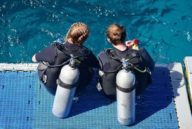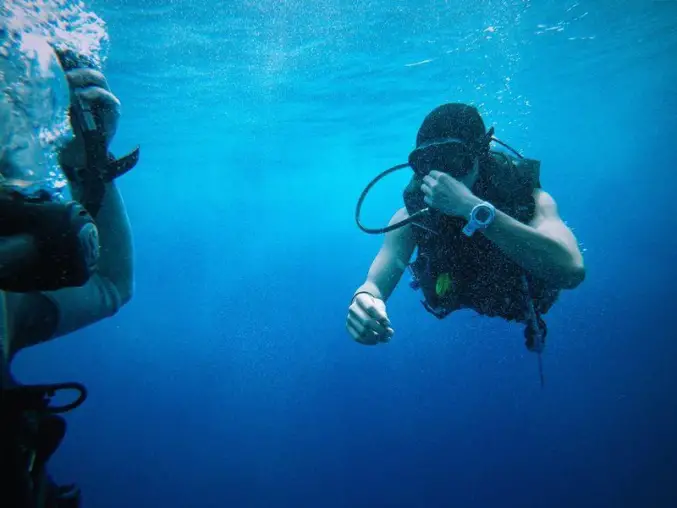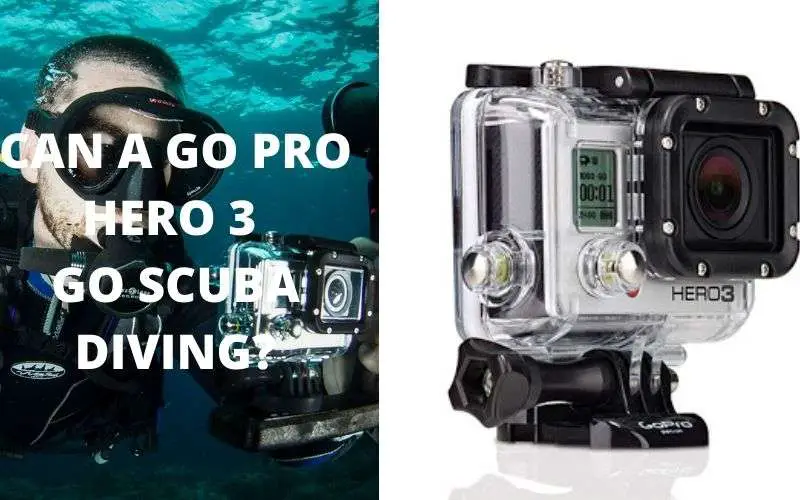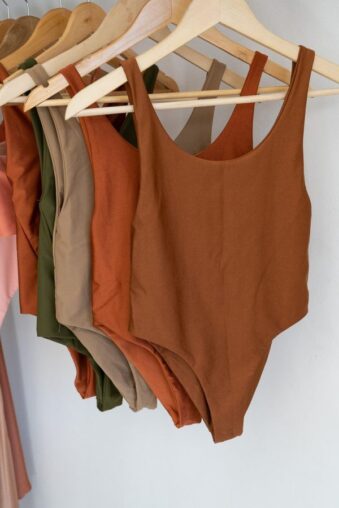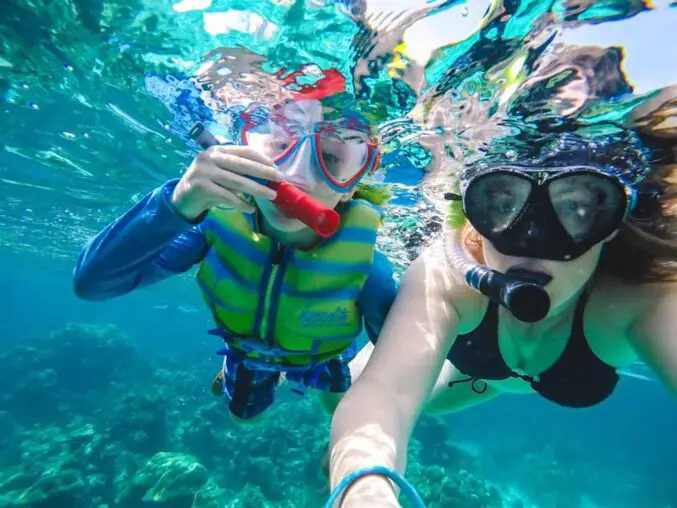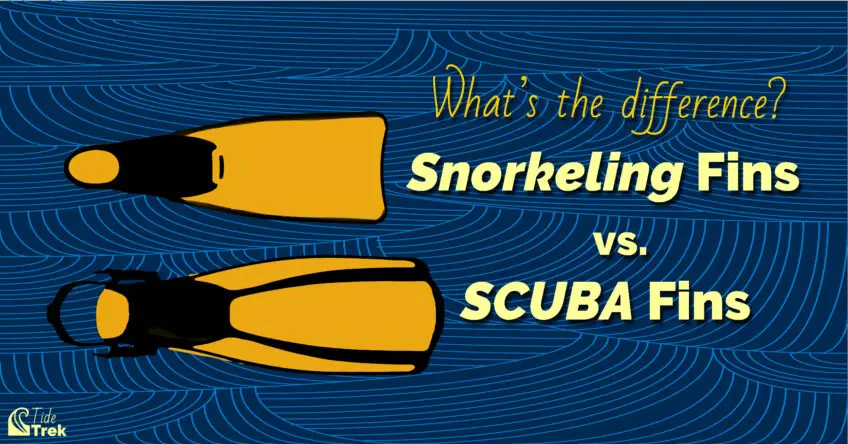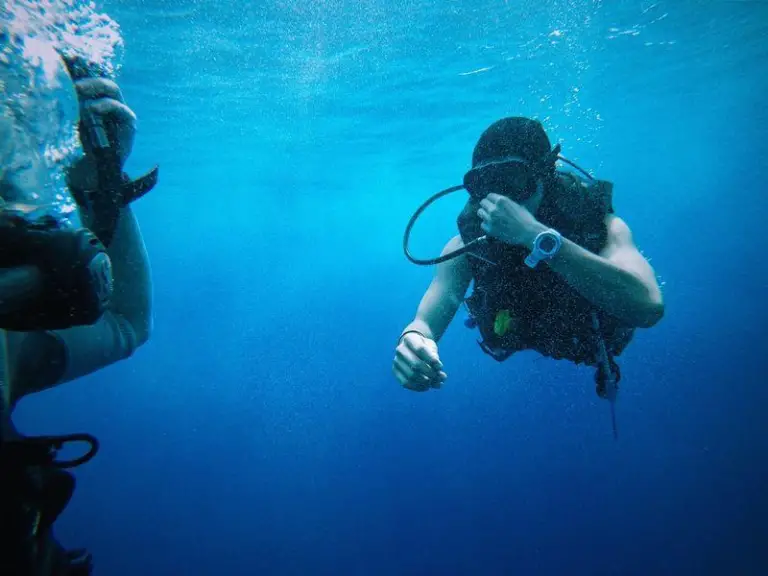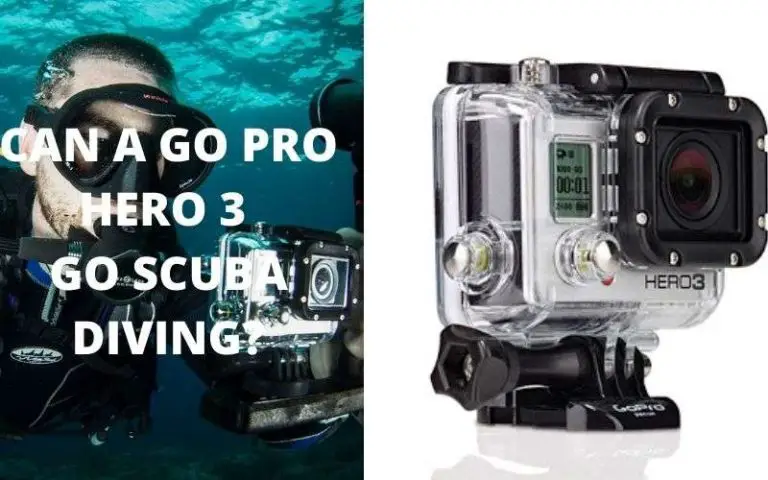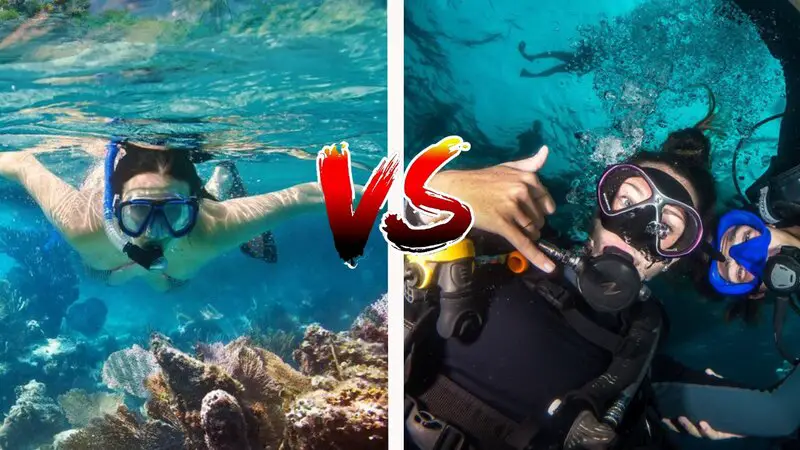
When you find yourself on a sun-soaked tropical island, with crystal-clear waters inviting you to explore the depths below, the decision between snorkeling and scuba diving becomes paramount.
These two aquatic activities offer distinct experiences, each with its own set of prerequisites, costs, and underwater capabilities. So, which path should you choose for your underwater escapade?
Snorkeling: A Splash of Simplicity
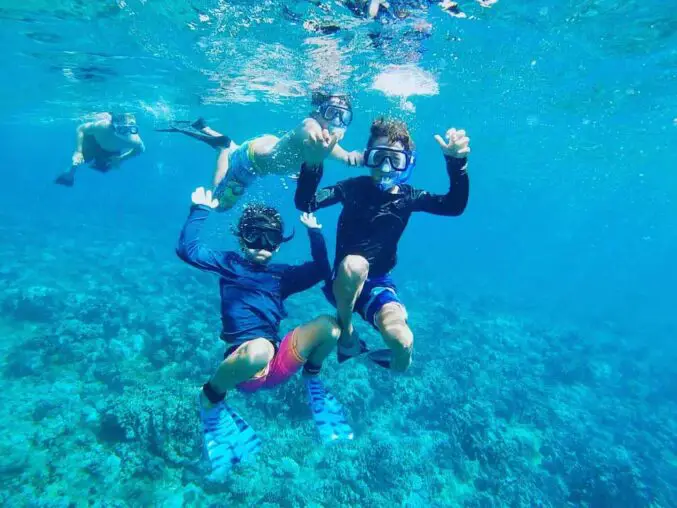
Snorkeling, the more accessible of the two options, allows you to float or swim on the water’s surface while gazing into the underwater wonderland through your submerged mask.
This straightforward activity grants you a sneak peek into the mesmerizing world of coral reefs, colorful fish, and vibrant marine flora—all without the need to resurface for air.
All it takes to snorkel is basic swimming skills, a mask, and a snorkel. If you prefer, you can enhance your experience with a flotation device, which prevents you from expending energy to stay afloat and extends your time beneath the surface.
Advanced snorkelers may even venture deeper or engage in spearfishing while enjoying the underwater marvels.
Snorkeling is remarkably inclusive, welcoming individuals of all ages and swimming proficiencies.
Even non-swimmers can partake, although basic swimming skills are highly recommended. Whether you embark from the shore or a boat, staying with a group is advisable for safety.
Scuba Diving: The Deep Dive
Scuba diving, an acronym for self-contained underwater breathing apparatus, involves using specialized gear to breathe beneath the waves. With scuba diving, the underwater world becomes your playground, and you can explore depths that snorkelers can only dream of reaching while holding their breath.
This thrilling activity opens doors to diverse career opportunities, from underwater welding and marine biology to scuba instruction and military diving operations. Yet, it comes with prerequisites and demands proper training, primarily due to the potential safety hazards associated with submersion at significant depths.
To embark on a scuba diving adventure, you must complete a scuba certification course. While one-day introductory courses or SNUBA diving allow you to experience scuba diving without certification, full-fledged recreational diving necessitates proper training.
Scuba certification involves both theoretical knowledge, gained through textbooks, and hands-on practice, which includes learning to use the equipment in a controlled environment before completing open-water dives. Once certified, your scuba credentials are lifelong, but refreshing your skills with a refresher course is advisable if it has been some time since your last dive.
The cost of scuba certification can range from $300 to $700, depending on the location and the number of open-water dives required. The training takes approximately 16 to 32 hours to complete.
Age Considerations: Snorkeling and Scuba Diving
Age plays a role in determining who can participate in these aquatic adventures. While snorkeling sets no specific age limit, it hinges more on an individual’s swimming ability and comfort in the water.
Some parents have introduced their children to snorkeling as young as five years old. To mitigate concerns, young children can wear life jackets, and it’s advisable to snorkel in shallow waters with minimal currents, such as those found near the shore or in protected areas.
On the other hand, many scuba diving training agencies establish a minimum age requirement of 10 years old for their Open Water courses. From ages 10 to 15, young divers can earn a Junior Open Water certification, which transitions to a regular Open Water certification after turning 16.
An exception is PADI’s Bubblemaker program, which allows children as young as eight to explore scuba gear in a shallow pool.
Physical Fitness: A Key Difference
In terms of physical fitness, snorkeling is relatively undemanding. While good cardiovascular health is beneficial, snorkelers mainly float on the water’s surface, aided by flotation devices.
However, the ability to hold your breath and confidence in your swimming skills can enhance your snorkeling experience.
Scuba diving, in contrast, imposes stricter fitness requirements due to the inherent risks associated with underwater exploration.
As divers descend, water pressure compresses the air inside their lungs, making it harder to breathe. For individuals with asthma or heart and lung conditions, scuba diving may pose a significant risk. Medical evaluations, particularly from diving doctors, are essential for those with pre-existing medical conditions.
Equipment: Basic vs. Comprehensive
Snorkeling equipment is straightforward and budget-friendly. At a minimum, you need a mask and a snorkel, with the option to add fins, a snorkel vest, and a rash guard. Purchasing all the essential gear for snorkeling typically costs between $100 and $200.
Innovative full-face snorkel masks are also available, combining mask and snorkel for added convenience.
Scuba diving, in contrast, demands a comprehensive set of specialized equipment:
- Dive mask
- Dive fins, gloves, and hood
- Scuba tank
- Two-stage regulator
- Wetsuit or drysuit
- Dive computer
- Submersible pressure gauge (SPG)
- Buoyancy compensator (BC)
The substantial gear requirements make traveling with your equipment challenging, leading many divers to rent gear at their destination. Owning a complete set of scuba gear can cost anywhere from $2,000 to over $5,000, depending on the quality and brand of the equipment.
Breathing Underwater: Snorkel Tube vs. Scuba Tank
Snorkelers breathe through a snorkel tube, which must remain above the water’s surface to access fresh air. Proper breathing involves taking deep breaths to ensure air flows smoothly through the tube. Short, shallow breaths should be avoided to prevent the accumulation of dead air.
Scuba divers, conversely, rely on a scuba tank for their air supply. The tank’s regulator depressurizes the gas, allowing safe inhalation. Divers must execute full inhales and exhales in a calm, controlled manner and never hold their breath, particularly when ascending to avoid lung overexpansion injuries.
Depth and Duration: Snorkeling vs. Scuba Diving
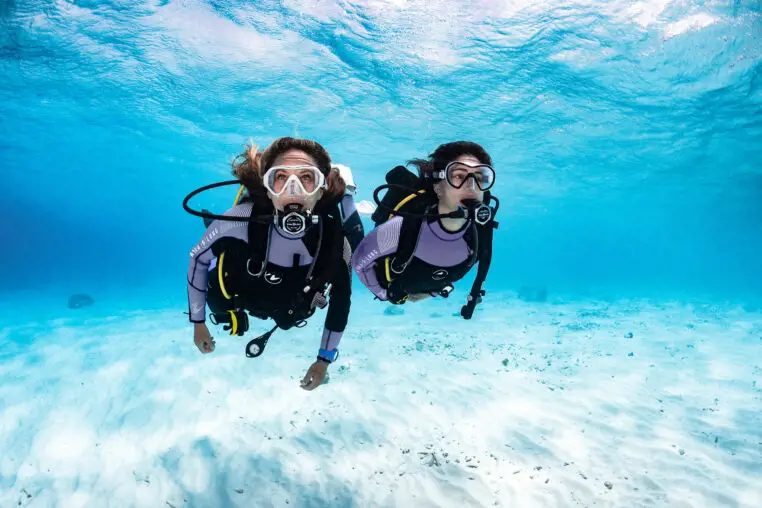
Snorkelers predominantly remain at the water’s surface, as the snorkel tube cannot be submerged without cutting off their air supply. While snorkelers can glimpse an array of marine life from the surface, they may occasionally venture deeper using the oxygen in their lungs.
In contrast, scuba divers can explore the ocean’s depths based on their training, equipment, and certification. Recreational divers are generally limited to 40 meters (130 feet), while technical divers can reach depths of 60 meters (200 feet).
However, with increased depth come higher risks, including a greater likelihood of decompression sickness, heightened effects of nitrogen narcosis, and reduced gas supply.
Time Spent Underwater: Snorkeling vs. Scuba Diving
Snorkelers can enjoy lengthy periods at the water’s surface, with the flexibility to surface as needed to catch their breath. However, continuous breathing through a snorkel may become taxing over time, and carbon dioxide (CO2) may accumulate in the tube, prompting more frequent breaths.
Scuba divers, conversely, can remain submerged as long as they have air in their tanks. The duration depends on various factors, such as lung capacity, fitness level, tank size, and depth.
Generally, a 3,000 PSI tank used at a depth of 30 feet can provide around 45 to 60 minutes of dive time. Dive computers also play a crucial role, warning divers to return to the surface if their nitrogen levels require decompression.
Risks and Dangers: Weighing Safety
In terms of safety, snorkeling is the less perilous choice. Risks to be mindful of include jellyfish stings, boat or jet ski traffic, sharp coral and rocks, sunburn, riptides, and unintentional drift away from the shore or boat. There is also the risk of drowning if you panic or venture into deep water without a flotation device.
Scuba diving, while generally safe as a recreational activity, introduces more significant risks. Decompression sickness, caused by surfacing too rapidly without proper decompression, stands as one of the most critical dangers. Equipment malfunctions, such as regulator failure or a malfunctioning dive computer, can also pose hazards.
Diving with heart or lung conditions is inadvisable, and divers should never hold their breath while submerged. Engaging in multiple dives with insufficient surface intervals increases the risk of decompression sickness.
After a scuba dive, it’s essential to avoid ascending to higher elevations for 18 to 24 hours, as elevated locations can elevate the risk of decompression sickness. Snorkelers, in contrast, face no such restrictions and are free to engage in other activities after their underwater excursions.
Snorkeling vs. Scuba Diving: Choosing Your Adventure
Comparing snorkeling to scuba diving is akin to weighing the merits of football against soccer—they offer distinct experiences with unique appeals. Your choice ultimately hinges on your preferences, expectations, and willingness to invest in your underwater adventure.
Snorkeling shines as a more accessible hobby. It demands no certifications, training, or substantial financial investment, making it a family-friendly activity. With snorkeling, you can catch a glimpse of the underwater realm while staying at the surface—an experience that satisfies many.
Scuba diving, on the other hand, unlocks the potential for deeper and more extended underwater exploration. It grants access to species and landscapes beyond the reach of snorkelers. However, it comes with higher costs, certification requirements, and increased safety considerations. Scuba diving appeals to adventurers who seek the thrill of the deep.
Conclusion
Both activities cater to diverse audiences, and the choice comes down to what aligns with your convenience and interests. Additionally, snorkeling can serve as an ideal stepping stone for those who envision themselves diving into the world of scuba in the future.
Ultimately, both offer unique advantages, making them equally fantastic choices for those eager to explore the mysteries of the deep blue. The choice is yours to make, guided by your own preferences and aspirations.


